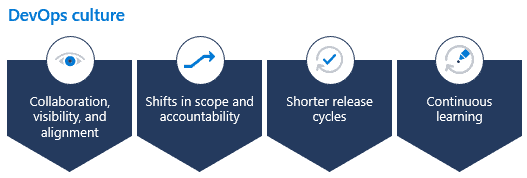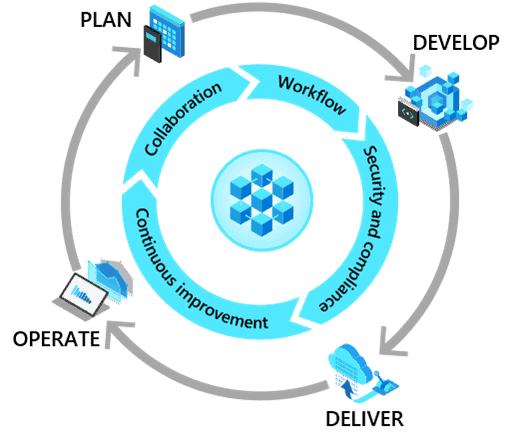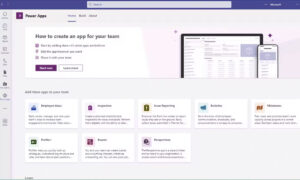A compound of development (Dev) and operations (Ops), DevOps is the union of people, processes, and technology to foster a culture of continually delivering value to customers. DevOps is a development methodology intended to decrease development time while providing the continuous delivery of high-quality software.
DevOps allows businesses to accelerate delivery while still delivering reliable products and services. It is about bringing people together through shared common goals, increased collaboration, and a focus on improvement.
Technology plays a key role in executing a DevOps strategy by enabling teams to collaborate more, enhance productivity, facilitate experimentation, and automate their processes from development to delivery and operations. It is also about delivering value faster by increasing efficiency, eliminating waste, and streamlining feedback to developers to continuously improve the product. The result: better products, delivered faster, to happier customers.
What does DevOps mean for teams? DevOps enables formerly siloed roles—development, IT operations, quality engineering, and security—to coordinate and collaborate to produce better, more reliable products. By adopting a DevOps culture along with DevOps practices and tools, teams gain the ability to feel confident in the applications they build, respond better to customer needs, and achieve business goals faster.
 DevOps and the application lifecycle
DevOps and the application lifecycle
DevOps influences the application lifecycle throughout its Plan, Develop, Deliver, and Operate phases. Each phase relies on the others, and the phases are not role-specific. In a true DevOps culture, each role is involved in each phase to some extent.
Debunking common misconceptions about DevOps
Here are several popular myths and misconceptions regarding DevOps. Let us discuss some here and see how much truth there is to them.
- Creating a dedicated “DevOps Team” – Many businesses start by thinking they need to create a dedicated DevOps team. In reality, DevOps brings your existing development and operations teams together to streamline the development cycle and reduce the meantime to deployment. To align these two teams, you should foster a collaborative work culture focused on automation, service quality, and operational stability.
- DevOps is only development and operations – The truth is that although DevOps includes the handoff of the development team to the operations team, it is not the end of the conversation. DevOps is about adopting an agile methodology to optimize processes throughout your IT organization. In other words, DevOps is the process of optimizing your delivery pipeline and the teams involved in the process.
- Tools don’t matter – The implementation of a difficult-to-use DevOps collaboration tool is an invitation for team members to work around it. And when developers and other technical staff work around a tool through shadow IT or other means, it can lead to a loss in productivity and reporting, as well as potential security risks. To mitigate this risk, pilot tools on small projects with a cross-section of the development and operations teams so that you can make educated decisions about DevOps tools.
- DevOps eliminates traditional IT roles – DevOps does not mean developers become database architects, cybersecurity specialists, and cloud engineers overnight. Instead, DevOps culture breaks down traditional silos between these teams—and others, including networking, security, and quality assurance—to deliver continuous value to customers and stakeholders.
- DevOps requires teams’ physical proximity – Another common misconception is that teams must be co-located for DevOps collaboration to work. Some managers still think all staff must be in the same room to work together as a team. However, remote workers, third-party contractors, and cloud service providers play increasingly significant roles in the delivery lifecycle. To quash this misconception requires the right tools and frameworks to support communication and collaboration along the DevOps lifecycle.
How DevOps can benefit your team
Teams that adopt DevOps culture, practices, and tools become higher-performing—building better products faster for greater customer satisfaction.
- Get to market faster for competitive advantage – Today’s markets move faster than traditional development methods. A modern DevOps process in the cloud lets you release and iterate quickly, even several times a day, if needed.
- Improve quality, performance, and customer satisfaction – Everyone expects more from technology now, so if you are not continually improving your applications, you are missing opportunities.
- Scale to handle your business growth – Grow your SaaS business and maintain business agility with fast development and deployment. Without fixed infrastructure limitations, scale-up or down as needed, paying only for what you use.
- Maintain system stability and reliability – Azure DevOps, for example, is backed by 24 x 7 support and a 99.9% SLA.
Plan smarter, collaborate better, deliver faster
Microsoft Azure DevOps has everything you need. It supports the Agile methodology and has a vast marketplace of tools to support all programming languages and other available products in the market. Most importantly, it integrates seamlessly with other available cloud providers.
To simplify and accelerate the continuous delivery of high quality and reliable products, Azure DevOps is highly recommended for new projects to improve your planning, development, delivery, and operations to meet your business needs. Engage with us to bring the advantages of DevOps to your organization.
This Abel Insight was written by Abel Solutions’ Farha Akhter, Sr. Developer.










